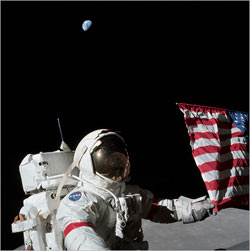You are hereWcP.Scientific.Mind's blog
WcP.Scientific.Mind's blog
Breakthrough: MIT researchers turn windows into solar panels, 10 times more effective solar power may be available in 3 years

(quote)
Researchers at MIT have created a new way to harness the sun's energy - by turning windows in big buildings into solar panels. The new technology, dubbed solar concentrators, harvests light over a wide area such as a window pane and then concentrates or gathers it at the window's edges, said Marc Baldo, a professor at MIT and head of the effort. Three members of the research team, which is publishing its findings in Friday's edition of Science, are in the process of incorporating a startup called Covalent Solar to develop the technology. The team has spent two years identifying organic dyes, painted onto glass or plastic, that can effectively concentrate the sun’s light onto solar cells, enabling them to produce more electricity from fewer cells.
The dyes basically reflect the light (technically, it’s actually absorbed and then sent back out), so that some of it is trapped inside the plane of glass, said Jon Mapel, a member of the research team. With the help of a scientific principal called "internal refraction," which is the same principal that keeps light trapped in optical fibers, the light bounces to the edges of the glass, which have been equipped with strips of solar cells that convert it into electricity. read more »
Stunning: the Earth and Moon hang in space as seen from Mars. Images: NASA's discovery of water ice on Mars. What’s next?
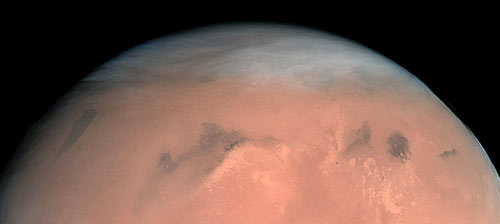
(quote)
The announcement by NASA of the discovery of water ice on Mars by its Phoenix Lander probe made big news everywhere. The discovery involved the observation of water ice sublimating into the air - that is, the water went from solid to vapor state without reaching the liquid stage. The Martian atmosphere has perfect conditions for sublimation - extremely thin, dry and cold. How cold? Well, you can check the Live Martian Weather Report, with data from a station on board the Phoenix Lander.
What more do we know about Mars' atmosphere? It's hundreds of times thinner than Earth's atmosphere and is made of 95% carbon dioxide, 3% nitrogen, 1.6% argon, and contains traces of oxygen, water, and methane. We also know, from observations that it can support dust storms, dust devils, clouds and gusty winds. With an amazing number of six current live probes exploring Mars (two rovers, a lander, and three orbiters), there are many thousands of images available. Only a few, however show atmospheric phenomena. Presented here are some of the best images of Martian atmosphere (and beyond) in action. read more »
Brilliant! Portugal clean-tech: world's biggest, £250m solar farm on abandoned land, less dependence on oil & gas
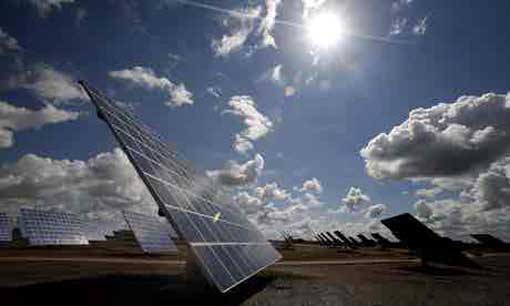
(quote)
5 June 2008
World's biggest solar farm at centre of Portugal's ambitious energy plan in country without oil or gas
From a distance the bizarre structures sprouting from the high Alentejo plain in eastern Portugal resemble a field of mechanical sunflowers. Each of the 2,520 giant solar panels is the size of a house and they are as technically sophisticated as a car. Their reflective heads tilt to the sky at a permanent 45 degrees as they track the sun through 240 degrees every day.
The world's largest solar photovoltaic farm, generating electricity straight from sunlight, is taking shape near Moura, a small town in a thinly populated and impoverished region which boasts the most sunshine per square metre a year in Europe.
When fully commissioned later this year, the £250m farm set on abandoned state-owned land will be twice the size of any other similar project in the world, covering an area nearly twice the size of London's Hyde park. It is expected to supply 45MW of electricity each year, enough to power 30,000 homes.
Portugal, without its own oil, coal or gas and with no expertise in nuclear power, is pitching to lead Europe's clean-tech revolution with some of the most ambitious targets and timetables for renewables. Its intention, the economics minister, Manuel Pinho, said, is to wean itself off oil and within a decade set up a low carbon economy in response to high oil prices and climate change.
"We have to reduce our dependence on oil and gas," said Pinho. "What seemed extravagant in 2004 when we decided to go for renewables now seems to have been a very good decision." read more »
Nonprofit Mozilla keeps innovating: free open source web browser Firefox 3 sets world record - 8.3 million downloads in 24 hours

(quote)
They were going for the gold and they got it - Firefox has set a world download record with the release of Firefox 3 with 8.3 million downloads. beating its own goal by three million. Mozilla reported that there were around 8,000 downloads a minute, with a one-day estimate of between five and seven million downloads. Almost 2,7 million users have downloaded Firefox 3 only in the United States. Germany has ranked second in the Top 10 of Firefox fans with 700,000 downloads, while in Spain and France the browser has surpassed 300,000 downloads.
Mozilla Firefox, the little Web browser with the quirky name, has grown up fast. Four years ago, Firefox was an obscure project Microsoft felt free to ignore. Now it has grabbed about a fifth of the market worldwide. And while Microsoft has shipped only one upgrade to its Internet Explorer in that time, Firefox just hit its fourth major release. Like the earlier 1.0, 1.5 and 2.0 versions, Firefox 3 -- a free download for Windows 2000, XP and Vista; Mac OS X 10.4 and 10.5; and recent Linux releases at http://mozilla.com - makes the Web easier and safer to use in a few distinct ways.
After 14-day mission, 217 orbits, 5.7 million miles around the Earth, space shuttle Discovery softly touches down with 7 crew
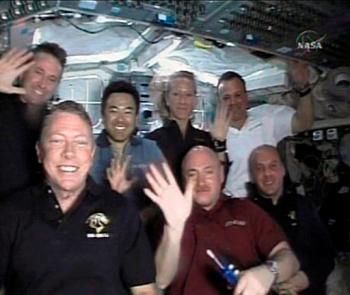
(quote)
The U.S. space shuttle Discovery and its seven-member crew returned to earth Saturday after a successful two-week mission to the International Space Station. The shuttle safely touched down at 11:15 a.m. local time (1515 UTC) at the U.S. space agency's landing strip at the Kennedy Space Center in the southeastern state of Florida.
The mission's highlight was the delivery and installation of a new $1 billion Japanese science laboratory. The 11-meter long lab is now the largest module on the orbiting space station.
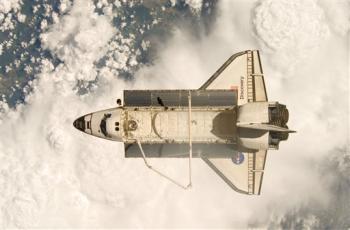
The Discovery crew also dropped off a new toilet pump to allow the Russian space station crew to fix their on board facilities. Discovery made 217 orbits and travelled 5.7 million miles around the Earth before it was given the green light to return home yesterday morning.
But on Friday Nasa engineers were forced to carry out last minute checks on the shuttle after astronauts spotted something floating away from their space ship. It turned out be a 12 inch metal clip from the rudder.
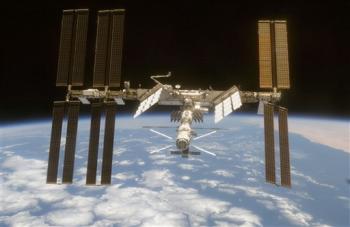
After four hours, the crew were told that its absence posed no danger for re-entry - during which temperatures around the shuttle can reach more than 2,500 degrees C.
Extensive checks are carried out on space shuttles before they begin re-entry after Columbia burned up as it entered the atmosphere, killing all seven crew on board, after foam panels in its heat shield were damaged during lift-off.

Commander Mark Kelly brought the shuttle safely back to Earth at 4.15pm (BST) yesterday afternoon through slightly cloudy skies. Television cameras were able to track the shuttle as it made its final approach, landed and deployed its brake parachute.
As Discovery came to a safe stop, Kelly said: "Great to be back." NASA officials described the landing as being as "smooth as it gets".
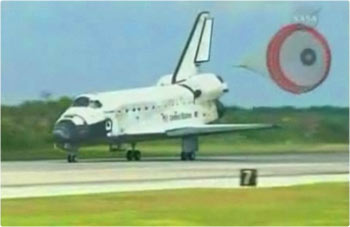
Astronauts also exchanged a member of the orbital outpost's permanent crew. American astronaut Greg Chamitoff remained on the space station for a six-month mission. He replaced U.S. astronaut Garrett Reisman who returned home after 95 days in space.
Reisman's wife, Simone Francis, was waiting at the Kennedy Space Center. Over the past week, Reisman described in quite romantic terms how much he missed her, calling her "my favourite Earthling".
(unquote)
Images Courtesy of AP Photo/NASA, BBC News
Original Source: BBC News (with video), The Telegraph, and VOA News
Next generation iPhone 3G to be released on July 11 with built-in GPS navigation for location-based services
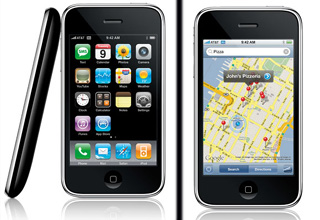
(quote)
The next generation iPhone will be released in 22 countries on July 11 - and is cheaper and faster than its predecessor. Apple boss Steve Jobs unveiled the new iPhone 3G at the company's Worldwide Developers Conference in San Francisco on Tuesday morning.
"Just one year after launching the iPhone, we're launching the new iPhone 3G that is twice as fast at half the price," he told the conference. The new version will be available through Vodafone in New Zealand, and will roll out in 22 countries on July 11. By the end of 2008 it will be on the market in 70 countries.
Discovery Channel 3-night series: NASA in 50 years, from Mercury to Gemini to Apollo, from Skylab to Hubble
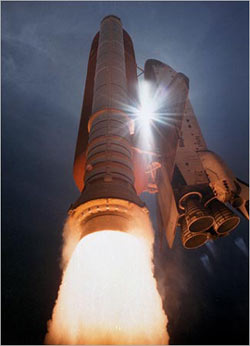
(quote)
The Discovery Channel marks the 50th anniversary of the National Aeronautics and Space Administration with “When We Left Earth: The NASA Missions”, a six-part, three-night series crafted from what a network news release describes as "NASA's own secret film vaults."
As fliers who weren't involved in, you know, bombing anything, yet were continually putting their own lives at risk, astronauts were especially attractive: Indeed, they were potentially leading the country into a post-national, interstellar future, when we would all be simply citizens of Earth and aliens would come only from other planets. Wasn't John Glenn's spacecraft called the Friendship 7?













